(完整word版)初中英语的不定式和动名词(整理版)
初中英语知识点归纳动词的不定式与动名词的综合运用

初中英语知识点归纳动词的不定式与动名词的综合运用初中英语知识点归纳:动词的不定式与动名词的综合运用动词是英语中的重要部分,不定式和动名词是动词的两种形式。
熟练地掌握不定式和动名词的用法,对于学习英语语法和提升英语水平都非常重要。
本文将对初中英语知识点中的动词不定式和动名词进行归纳总结,以及它们的综合运用。
一、动词的不定式动词的不定式由动词原形前加to构成,具有名词、形容词和副词的特性。
在句子中,它可以作为主语、宾语、表语和定语。
1. 作为主语:To learn English well is my goal.学好英语是我的目标。
2. 作为宾语:I want to visit Beijing next month.我想下个月去北京旅游。
3. 作为表语:Her dream is to become a doctor.她的梦想是成为一名医生。
4. 作为定语:I have a book to read.我有一本书可以读。
二、动名词动名词是动词加-ing形式,具有名词的特性。
它可以作为主语、宾语、表语和定语。
1. 作为主语:Reading is my favorite hobby.阅读是我的最爱。
2. 作为宾语:She enjoys singing and dancing.她喜欢唱歌和跳舞。
3. 作为表语:Her job is teaching English.她的工作是教英语。
4. 作为定语:The running water sounds so refreshing.流水的声音听起来很清新。
三、不定式与动名词的综合运用在实际应用中,我们经常需要将不定式和动名词结合使用,构成复合结构,完成句子的表达。
1. 不定式与动名词作为复合宾语:She enjoys playing the piano.她喜欢弹钢琴。
2. 不定式与动名词作为复合宾语:I want to go swimming this weekend.我想这周末去游泳。
初中英语动名词和不定式归纳
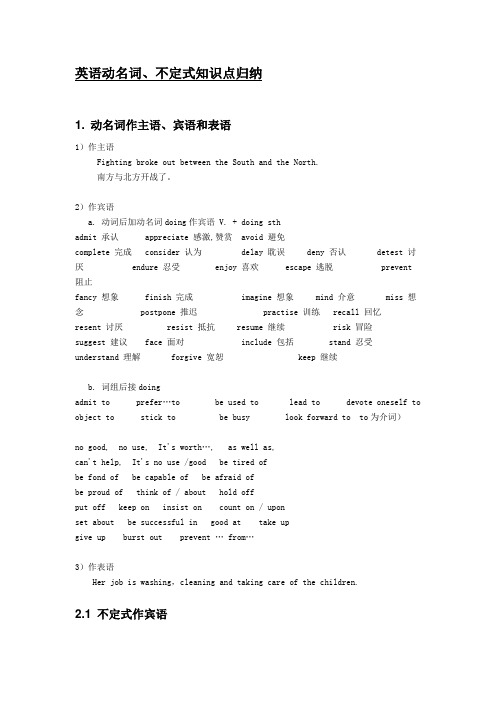
英语动名词、不定式知识点归纳1. 动名词作主语、宾语和表语1)作主语Fighting broke out between the South and the North.南方与北方开战了。
2)作宾语a. 动词后加动名词doing作宾语 V. + doing sthadmit 承认appreciate 感激,赞赏avoid 避免complete 完成 consider 认为 delay 耽误 deny 否认 detest 讨厌 endure 忍受enjoy 喜欢escape 逃脱 prevent阻止fancy 想象finish 完成 imagine 想象 mind 介意 miss 想念 postpone 推迟 practise 训练 recall 回忆resent 讨厌resist 抵抗 resume 继续 risk 冒险suggest 建议face 面对 include 包括stand 忍受understand 理解 forgive 宽恕 keep 继续b. 词组后接doingadmit to prefer…to be used to lead to devote oneself to object to stick to be busy look forward to to为介词)no good, no use, It's worth…, as well as,can't help, It's no use /good be tired ofbe fond of be capable of be afraid ofbe proud of think of / about hold offput off keep on insist on count on / uponset about be successful in good at take upgive up burst out prevent … from…3)作表语Her job is washing,cleaning and taking care of the children.2.1 不定式作宾语1) 动词+ 不定式afford aim appear agree arrange ask be decide bother care choose come dare demand desire determineexpect elect endeavor hope fail happen help hesitate learn long mean manage offer ought plan prepare pretend promise refuse seem tend wait wishundertake2) 动词+宾语+不定式advise allow appoint believe cause challenge command compel consider declare drive enable encourage findforbid force guess hire imagine impel induceinform instruct invite judge know like orderpermit persuade remind report request require select send state suppose tell think train trust understand urge warn2.2 不定式作主语1) Eg:It's easy (for me) to do that.我做这事太容易了easy, difficult, hard, important, possible, impossible, comfortable, necessary, better;the first, the next, the last, the best, too much, too little, not enough2)It's for sb.和It's of sb.区别1)for sb. 常用于表示事物的特征特点,表示客观形式的形容词,如easy, hard, difficult, interesting, impossible等:It's very hard for him to study two languages. 对他来说学两门外语是很难的。
英语语法动名词和不定式详解

英语语法动名词和不定式详解
动名词与不定式
动名词表达的是:状态,性质,心境,抽象,经常性,已发生的。
不定式表达的是:目的,结果,原因,具体,一次性,将发生的。
无论是接不定式还是动名词,基本含义相同,但用法会有细微差别。
动名词与不定式语义不同的有11 组:
stop doing/to do
这里,以stop为例,详细讲一讲用法。
stop to do 停止,中断做某事后去做另一件事。
stop doing 停止做某事。
例句:
They stop to smoke a cigarette.
他们停下来,抽了根烟。
I must stop smoking.
必须戒烟了。
典型例题
She reached the top of the hill and stopped ___ on a big rock by the side of the path.
A. to have rested
B. resting
C. to rest
D. rest
答案:C。
由题意可知,她到了山顶,停下来在一个路边的大石头上休息。
因此,应选择'stop to do sth,停下来去做另一件事'。
而不仅仅是爬山动作的终止,所以stop doing sth不正确。
初中英语知识点归纳动词的不定式和动名词用法总结
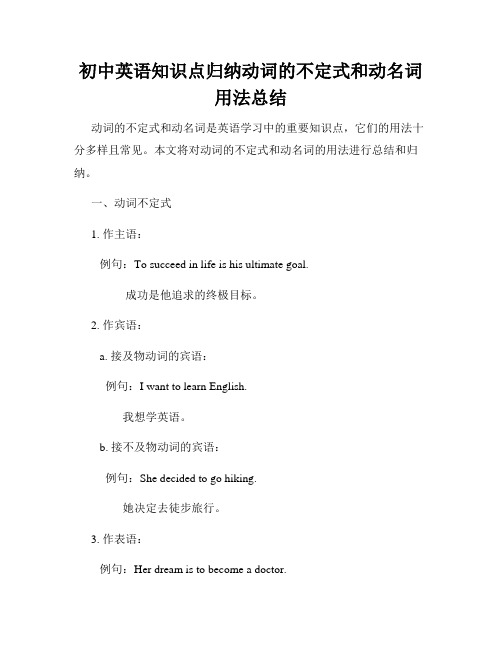
初中英语知识点归纳动词的不定式和动名词用法总结动词的不定式和动名词是英语学习中的重要知识点,它们的用法十分多样且常见。
本文将对动词的不定式和动名词的用法进行总结和归纳。
一、动词不定式1. 作主语:例句:To succeed in life is his ultimate goal.成功是他追求的终极目标。
2. 作宾语:a. 接及物动词的宾语:例句:I want to learn English.我想学英语。
b. 接不及物动词的宾语:例句:She decided to go hiking.她决定去徒步旅行。
3. 作表语:例句:Her dream is to become a doctor.她的梦想是成为一名医生。
4. 作补语:a. 表示命令、建议、请求等:例句:She told me to wait for her at the gate.她告诉我在门口等她。
b. 表示目的、目标等:例句:He went to the store to buy some groceries.他去商店买一些杂货。
5. 作定语:例句:We need a person to help us with the project.我们需要一个人来帮助我们完成这个项目。
6. 作状语:a. 表示目的、结果、原因等:例句:He studied hard to pass the exam.他努力学习为了通过考试。
b. 表示时间、条件等:例句:I woke up early to catch the bus.我早起为了赶公交车。
二、动名词1. 作主语:例句:Swimming is my favorite sport.游泳是我最喜欢的运动。
2. 作宾语:例句:I enjoy reading books in my free time.我喜欢在空闲时间读书。
3. 作表语:例句:Her hobby is dancing.她的爱好是跳舞。
4. 作补语:例句:His job is teaching English.他的工作是教英语。
初中英语动词不定式及动名词总结
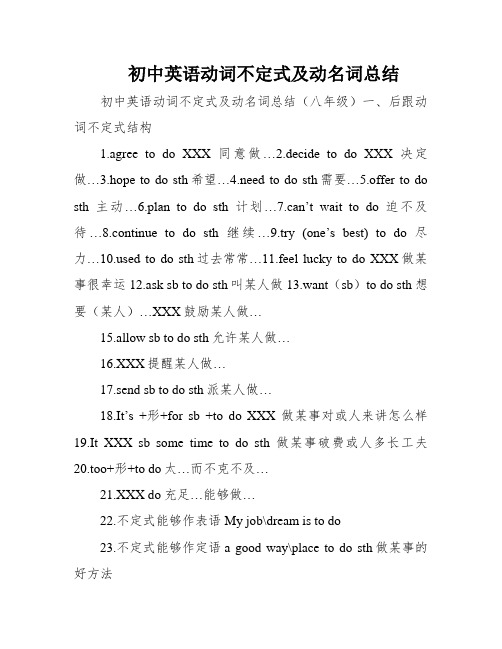
初中英语动词不定式及动名词总结初中英语动词不定式及动名词总结(八年级)一、后跟动词不定式结构1.agree to do XXX同意做…2.decide to do XXX决定做…3.hope to do sth希望…4.need to do sth需要…5.offer to do sth主动…6.plan to do sth计划…7.can’t wait to do迫不及待…8.continue to do sth继续…9.try (one’s best) to do尽力…ed to do sth过去常常…11.feel lucky to do XXX做某事很幸运12.ask sb to do sth叫某人做13.want(sb)to do sth想要(某人)…XXX鼓励某人做…15.allow sb to do sth允许某人做…16.XXX提醒某人做…17.send sb to do sth派某人做…18.It’s +形+for sb +to do XXX做某事对或人来讲怎么样19.It XXX sb some time to do sth做某事破费或人多长工夫20.too+形+to do太…而不克不及…21.XXX do充足…能够做…22.不定式能够作表语My job\dream is to do23.不定式能够作定语a good way\place to do sth做某事的好方法24.不定式能够表目的To get good grades。
I must study hard2、后跟动名词方式1.consider doing sth考虑2.XXX喜爱3.XXX XXX做完某事4.mind doing sth介意5.keep doing sth一直keep on doing sth继续|坚持6.can’t。
doing sth停不下来7.can’t。
help doing sth不由得8.put off doing sth推迟9.give up XXX摒弃10.ba busy doing sth忙于11.have a good time doing XXX做某事很开心12.have XXX做某事很困那13.how \what about doing sth…怎么样14.XXX成功做15.XXX感谢做16.be XXX对做某事感乐趣be afraid of doing sth害怕be good at doing sth善于于XXX对做…自豪be used to doing sth惯于17.sb spend some time (in) doing sth18.XXX三.即可加to do又可加ing,但意思差别大XXX do XXX忘记要做某事(事情还未做)XXX遗忘做过某事(工作已做)XXX记得要做某事(事情还未做)XXX记得做过某事(事情已做)try to do XXX尽力去做某事XXX尝试做某事to do XXX停下了去做某事XXX停止做某事used to do XXX过去常常做某事be used to doing sth气于做某事四.后跟动词原型make sb do XXX使某人做某事let sb do XXX让某人做某事help sb (to) do sth帮助或人做某had better do XXX最好做某事五.便可跟原型,又可跟ingsee sb do XXX看见某人做了某事(事情已发生)XXX瞥见或人正在做某事(工作正在产生)hear sb do XXX听见或人…了(工作已产生)。
初中英语知识点归纳动名词和不定式的用法
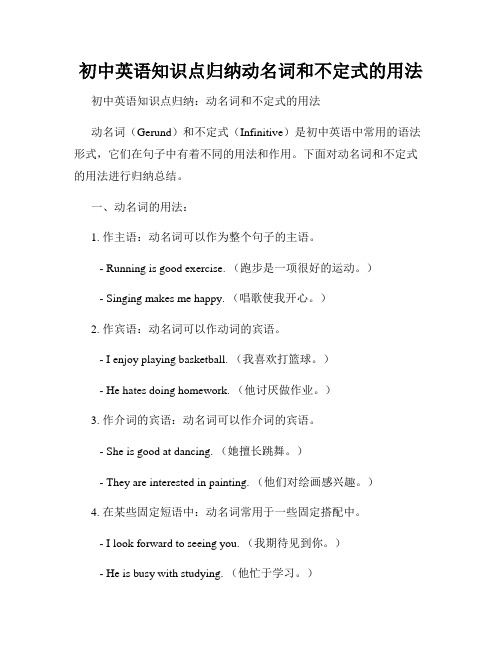
初中英语知识点归纳动名词和不定式的用法初中英语知识点归纳:动名词和不定式的用法动名词(Gerund)和不定式(Infinitive)是初中英语中常用的语法形式,它们在句子中有着不同的用法和作用。
下面对动名词和不定式的用法进行归纳总结。
一、动名词的用法:1. 作主语:动名词可以作为整个句子的主语。
- Running is good exercise. (跑步是一项很好的运动。
)- Singing makes me happy. (唱歌使我开心。
)2. 作宾语:动名词可以作动词的宾语。
- I enjoy playing basketball. (我喜欢打篮球。
)- He hates doing homework. (他讨厌做作业。
)3. 作介词的宾语:动名词可以作介词的宾语。
- She is good at dancing. (她擅长跳舞。
)- They are interested in painting. (他们对绘画感兴趣。
)4. 在某些固定短语中:动名词常用于一些固定搭配中。
- I look forward to seeing you. (我期待见到你。
)- He is busy with studying. (他忙于学习。
)5. 作宾补:动名词可以作及物动词的宾补。
- She found it interesting watching movies. (她认为看电影很有趣。
) - They made her captain of the team. (他们让她成为队长。
)二、不定式的用法:1. 作动词的宾语:不定式可以作动词的宾语。
- I want to study abroad. (我想出国留学。
)- He loves to play the piano. (他喜欢弹钢琴。
)2. 作形容词的定语:不定式可以作名词或代词的定语。
- This is a good book to read. (这是本值得阅读的好书。
英语非谓语动词:不定式,动名词和分词

英语非谓语动词:不定式,动名词和分词非谓语动词分为三种形式:不定式、动名词和分词(包括现在分词和过去分词)(一)动词不定式动词不定式可以作主语、宾语、宾语补足语、定语、状语、表语。
动词不定式由“to+动词原形”构成,否定形式“not to +动词原形”。
1.用法(1)作主语。
往往用it作为形式主语。
如:It is time to get up.(2)作宾语。
如果带有宾语补足语,往往把不定式短语放在宾语补足语之后,用it作形式宾语。
如:I find it interesting to study English.有些动词只能用动词不定式作宾语。
如:decide,plan,desire,hope,wish,promise,ask,agree, manage等。
(3)作宾语补足语A:带to的动词不定式有:ask,tell,want,teach,advise,allow,beg,invite等。
如:He asked me to do the work.B :接不带to的动词不定式有:see,watch,hear,make ,let等。
如:I often see him play football.使役动词不带to,动词有:一感二听三让四观看。
一感:feel 二听:hear, listen to 三让:let,have,make 四观看:observe,see,watch,look at注意:feel, hear,notice, see,watch,have,make等词后的补足语中,不定式不带to,但变成被动结构时,要带to.如:I often hear him cry. He is often heard to cry.注意:带but介词的不定式。
如果介词之前有行为动词do的各种形式,那么but后的不定式不带to,否则要带to。
另外,在can’t choose but...和can’t help but...等后面的不定式也省略to。
初中英语知识点归纳动词的不定式与动名词的用法

初中英语知识点归纳动词的不定式与动名词的用法动词的不定式与动名词是英语中常见的两种动词形式,它们在句子中有各自独特的用法。
本文将对初中英语中动词的不定式与动名词的用法进行归纳总结。
一、动词的不定式的用法1. 不定式作为主语不定式可以作为句子的主语,常用的句型有:- To study English is important.- To succeed needs hard work.- To learn a foreign language is challenging.2. 不定式作为宾语不定式可以作为及物动词的宾语,常用的动词有:- want, hope, plan, decide等。
例如:- She wants to go shopping.- They hope to win the game.- I plan to visit my grandparents next week.3. 不定式作为表语不定式也可以作为句子的表语,常用的句型有:- The best way to learn is to practice.- His dream is to become a doctor.- My goal is to travel around the world.4. 不定式作为状语不定式可以作为状语修饰动词、形容词或副词。
常用的句型有:- I woke up early to catch the train.- She was too tired to continue working.- He spoke slowly to make sure everyone understood.二、动名词的用法1. 动名词作为主语动名词可以作为句子的主语,常用的句型有:- Swimming is my favorite sport.- Reading books is a good way to relax.- Playing basketball requires teamwork.2. 动名词作为宾语动名词可以作为及物动词的宾语,常用的动词有:- enjoy, like, love, hate等。
(最新整理)初中英语动名词和动词不定式归纳

初中英语动名词和动词不定式归纳编辑整理:尊敬的读者朋友们:这里是精品文档编辑中心,本文档内容是由我和我的同事精心编辑整理后发布的,发布之前我们对文中内容进行仔细校对,但是难免会有疏漏的地方,但是任然希望(初中英语动名词和动词不定式归纳)的内容能够给您的工作和学习带来便利。
同时也真诚的希望收到您的建议和反馈,这将是我们进步的源泉,前进的动力。
本文可编辑可修改,如果觉得对您有帮助请收藏以便随时查阅,最后祝您生活愉快业绩进步,以下为初中英语动名词和动词不定式归纳的全部内容。
1。
动词+doing(只能加doing的动词) Like/dislike/enjoy/have fun +doing喜欢做mind (sb) doing介意做imagine doing 想象做suggest doing建议做practice doing练习做finish doing结束做what about/ how about doing sth 做某事如何Thank you for doing sth。
为…感谢某人at the beginning of 的起初;……的开始keep/go (on) /continue doing持续做can't help doing情不自禁做can’t stand doing不能忍受做can’t stop doing sth 忍不住做某事feel like doing想要做go +doing (go shopping)去做某事no +doing 禁止做某事be worth doing 值得做be busy doing sth 忙于做某事spend time/money (in) doing 花费时间做某事waste time/money (in) doing浪费时间做某事consider doing sth 考虑做某事havetrouble/difficulty/problems/experience (in) doing 做某事有困难/有经验used to do 过去常常做某事be /get used for doing sth = be used to do sth. 被用来作某事be /get/used to doing 习惯于做某事pay attention to doing 注意做某事hold on to doing sth 坚持做某事look forward to doing期望做某事be interested in doing=take an interest in doing对———感兴趣be good at doing sth= do well in doing sth.擅长作某事about: be worried about doing担忧做be embarrassed about doing尴尬做be annoyed about doing反感做with: be pleased with doing对做-——满意prefer doing to doing宁愿-也不愿without: without doing没做from: stop sb (from) doing=prevent sb from doing=keep sb from doing(但keep sb doing使某人不停的做) by: by doing通过做22 2. 动词+doing和to do 意义无大区别begin doing/ begin to dostart doing/ start to do开始做continue doing/to do持续做like doing / like to dolove doing / love to do 喜欢做hate doing/ hate to do讨厌做3 3. 动词+doing和to do意义不同forget doing 忘记做过某事forget to do忘记去做某事(还未做)remember doing 记得做过某事remember to do记得要去做某事(还未做)stop doing=give up doing sth 停止做某事stop to do停下来去做另一件事try /try one’s best to do尽力做need doing需要被做(主语指物)need to do 需要做(主语指人)4. 动词+to doagree to do同意做want to do想要做would like to do想要做,愿意做decide to do决定做hope/ wish to do希望做plan to do 计划做be supposed to do sth =should do sth应该做某事learn to do学会做be /make sure to do sth 确定做某事offer to do 主动要求做help (to) do /help sb with sth帮着做afford to do担负得起做refuse to do拒绝做regret to do 遗憾地做dare to do敢做seem to do似乎做promise to do许诺做can't wait to do迫不及待做pretend to do假装做used to do过去常常做get to do逐渐做have sth /nothing to do 有某事要做it’s one’s duty to do sth 做某事是某人的责任make up /change one’s mind to do sth.下定/改变某人决心做某事the way to do sth = the way of doing sth 做某事的方法 the way to +地方去哪的路其他用法:疑问词+ to dowhen/where/what/how/which/whether…to do形式主语:sb+think/feel/find…it+形容词+ to doIt is +形容词+of/for sb.+ to dotoo+形容词+to do sth =not enough to do= so thatit takes sb. some time to do sth。
初中英语的不定式和动名词(整理版)

初中英语的不定式和动名词(整理版)2)XXX.记得去做某事(还未做)3) XXX停止做某事(正在做)4) to do sth.停下来去做某事(为了去做)5)try XXX.试着做某事(尝试)6)try to do sth.努力去做某事(尽力)动词不定式是英语中的一种非常重要的语法结构,它可以作主语、宾语、表语、定语、状语等。
掌握好动词不定式的用法,可以使我们的英语表达更加地准确、地道。
在使用动词不定式时,需要注意动词后面要接不定式,还是动名词,以及不同的动词接不同的结构。
首先,我们需要知道哪些动词只能接不定式作宾语。
这些动词包括want、agree、choose、decide、expect、hope、earn、need、offer、prefer、promise、plan、refuse和would like等。
我们需要记住这些动词,以便在使用时不出错。
其次,还有一些动词只能接动名词作宾语,如enjoy、mind、practice、finish、suggest、deny、admit、keep、spend 和feel like等。
这些动词的用法也需要我们掌握。
除此之外,还有一些动词既可以接不定式,也可以接动名词,但意思有所不同。
例如,begin/start to do sth.和begin/start doing sth.的意思都是“开始做某事”,但前者表示动作的开始,后者则表示动作的进行。
同样地,like/love to do sth.和like/love doing sth.的意思也不同,前者表示偏好,后者则表示喜欢的状态。
最后,我们需要注意一些动词后接不定式或动名词时的区别。
例如,XXX和XXX的意思不同,前者表示记得已经做过的事情,后者则表示记得要去做某事。
类似地。
doing。
to do sth.的意思也不同,前者表示停止正在进行的动作,后者则表示停下来去做某事。
1.Remember to do something means to keep in mind that you need to do something that you haven't done yet.2.et doing something means that you have done something。
初中英语动词不定式和动名词全面归纳
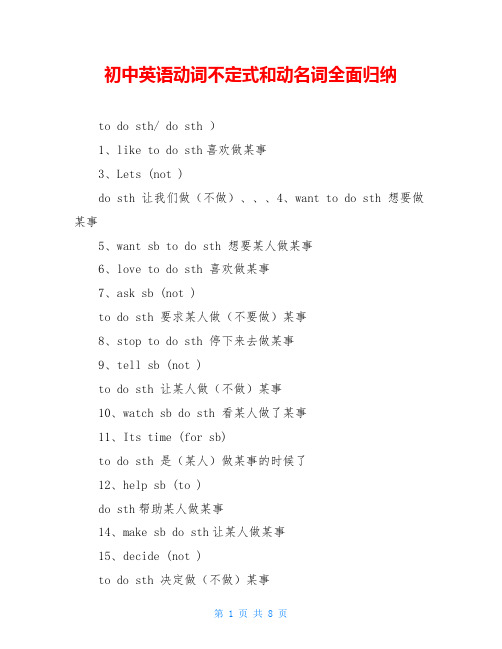
初中英语动词不定式和动名词全面归纳to do sth/ do sth )1、like to do sth喜欢做某事3、Lets (not )do sth 让我们做(不做)、、、4、want to do sth 想要做某事5、want sb to do sth 想要某人做某事6、love to do sth 喜欢做某事7、ask sb (not )to do sth 要求某人做(不要做)某事8、stop to do sth 停下来去做某事9、tell sb (not )to do sth 让某人做(不做)某事10、watch sb do sth 看某人做了某事11、Its time (for sb)to do sth 是(某人)做某事的时候了12、help sb (to )do sth帮助某人做某事14、make sb do sth让某人做某事15、decide (not )to do sth 决定做(不做)某事16、find it +adj + to do sth发现做某事是、、、、的17、have to do sth 不得不做某事18、try (not )to do sth 试图(不)去做某事19、try ones best to do sth 尽某人最大的努力去做某事20、Its +adj +(for)of +sb + to do sth 对某人来说做某事是、、、的21、plan to do sth 计划做某事22、S、p、+be a good place to do sth 某地是、、、的好地点23、It takes sb +some time + to do sth 某人花费多少时间做某事24、send sb to do sth派某人去做某事25、invite sb to do sth 邀请某人去做某事26、forget to do sth 忘记做某事28、be able to do sth 能够做某事30、seem to do sth 似乎做某事32、疑问词+ to do sth33、need sth to do sth 需要某物做某事34、use sth to do sth 使用某物做某事35、follow sb to sth 跟随某人做某事36、need to do sth 需要做某事37、a good time to do sth 做某事的好时间38、the best time to do sth做某事的最佳时间39、the best way to do sth 做某事的最好的方法40、be the first / last one to do sth第一个/最后一个做某事的人41、would like to do sth 想要做某事42、be excited /surprised to do sth 做某事很兴奋/吃惊43、be useful to do sth 、、、、对于做某事是有用的44、be allowed to do sth 被允许/可以做某事45、allow sb to do sth 允许某人做某事46、Its better to do sth 最好做某事47、Its best to do sth 做某事棒极了48、take care (not)to do sth 注意要(不要)做某事49、see sb do sth看见某人做了某事50、why not do sth ?为什么不做某事呢?51、have enough time to do sth 有足够的时间做某事52、too… to do sth 太、、、而不能做、、、、53、not… enough to do sth 不是足够、、、而不能、、、54、encourage sb to do sth 鼓励某人做某事55、choose to sth 选择做某事56、wait to do sth 等待做某事57、be happy/glad/pleased to do sth 做某事很高兴58、make it +adj + to do sth 让做某事、、、59、be careful to do sth谨慎做某事60、be afraid to do sth 害怕做某事61、Its our duty to do sth 做某事是我们的责任62、used to do sth 过去常常做某事64、make a decision to do sth 做决定做某事65、have an opportunity to do sth 有机会做某事66、wait for sb to do sth 等待某人做某事67、would do sth rather than do sth 宁愿做、、、而不愿做、、、68、would rather do sth than do sth 比起做、、、更愿意做、、、69、hurry to do sth 匆忙做某事70、refuse to do sth 拒绝做某事71、agree to do sth 同意做某事72、pretend to do sth 假装做某事73、pretend to be doing sth 假装正在做某事74、prefer to do sth 更喜欢做某事75、prefer not to do sth 更不喜欢做某事76、prefer to do sth raher than do sth 比起做、、、更喜欢做、、、77、be willing to do sth 情愿做某事78、volunteer +时间/ 钱 + to do sth 自愿花时间/钱去做某事79、volunteer to do sth 自愿做某事80、offer to do sth 提出要做某事81、rush to do sth 赶着去做某事82、in order (not )to do sth为了(不)做某事83、be certain to do sth 一定会做某事84、be sure to do sth 务必做某事85、make plans to do sth 制定计划做某事86、go out of their way to do sth 花尽心思去做某事87、lead sb to do sth 带领某人做某事88、Its ones job to do sth 做某事是某人分内的事89、Its ones turn to do sth 轮到某人做某事90、urge sb to do sth 强烈要求某人做某事91、Could /Would you please (not)do sth ? 你能不能(不)做某事?92、be supposed to do sth=should do sth 应该做某事93、warn sb to do sth 警告某人做某事二、接动名词(doing sth )1、like doing sth 喜欢做某事2、enjoy doing sth 很喜欢做某事3、have fun doing sth 做某事很愉快4、be interested in doing sth 对做某事感兴趣5、Thanks for doing sth 感谢做、、、7、stop sb doing sth 阻止某人做某事8、stop sb from doing sth阻止某人做某事9、go + v-ing 去、、、10、do the (some )+v-ing 你懂的,不解释11、What/How doing sth ? 做、、、怎么样?12、practice doing sth 练习做某事13、watch sb doing sth 看见某人正在做某事14、find sb doing sth 发现某人做着做某事15、mind (ones )doing sth 介意(某人)做某事16、cant stand doing sth不能忍受做某事17、think about doing sth 考虑做某事18、spend … (in)doing sth 做某事花费、、、19、finish doing sth 完成做、、、、20、be busy doing sth 忙于做某事21、keep doing sth 继续做某事22、keep sb from doing sth 阻止某人做某事23、keep sb doing sth 让某人一直做某事24、be good at doing sth 擅长做某事25、hate doing sth 讨厌做某事26、There be +名词+doing sth 有、、、正在做某事27、make a living by doing sth 通过做、、、谋生28、have a difficult time doing sth 做某事很艰苦29、feel like doing sth 想要做某事32、by doing sth 通过做某事33、end up doing sth 以做某事结束34、do a survey about doing sth 对做某事做个调查35、be afraid of doing sth 害怕做某事36、be used to doing sth 习惯于做某事37、be terrified of doing sth 害怕做某事38、give up doing sth 放弃做某事39、instead of doing sth 反而做了某事40、have nothing against doing sth 不反对做某事41、be serious about doing sth 对于做某事时认真的42、have a chance of doing sth 有机会做某事43、before/ when /while +doing sth44、start doing sth 开始做某事45、have a lot of experience doing sth对做某事有很多经验46、prefer doing sth 更喜欢做某事47、consider doing sth 考虑做某事48、dream of / about doing sth 梦想做某事49、continue doing sth 继续做某事50、put off doing sth 推迟做某事51、be used for doing sth =be used to do sth、、是被来做某事的52、prefer doing sth to doing sth 比起做、、、更喜欢做、、、53、without doing sth 没有做、、、、54、be comfortable doing sth 做某事很舒服55、cant stop/help doing sth 忍不住做某事56、look forward to doing sth 期待做某事57、be against doing sth 反对做某事58、have trouble/problems/difficulty (in)doing sth 做某事有困难59、suggest doing sth 建议做某事60、be busy doing sth 忙于做某事61、be worth doing sth值得做某事。
初中英语知识归纳动词的不定式和动名词
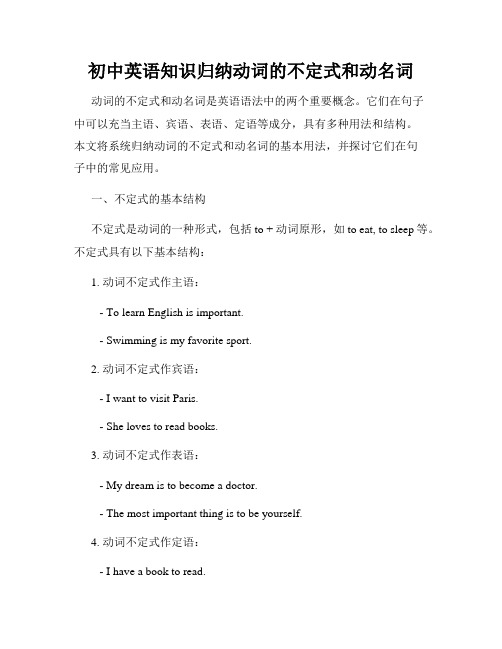
初中英语知识归纳动词的不定式和动名词动词的不定式和动名词是英语语法中的两个重要概念。
它们在句子中可以充当主语、宾语、表语、定语等成分,具有多种用法和结构。
本文将系统归纳动词的不定式和动名词的基本用法,并探讨它们在句子中的常见应用。
一、不定式的基本结构不定式是动词的一种形式,包括to + 动词原形,如to eat, to sleep等。
不定式具有以下基本结构:1. 动词不定式作主语:- To learn English is important.- Swimming is my favorite sport.2. 动词不定式作宾语:- I want to visit Paris.- She loves to read books.3. 动词不定式作表语:- My dream is to become a doctor.- The most important thing is to be yourself.4. 动词不定式作定语:- I have a book to read.- We need a place to live.二、动词不定式的常见用法1. 表示目的和意图:- I study hard to pass the exam.- He exercises regularly to stay healthy.2. 接在情态动词后,表示推测、推理:- He must be asleep.- They may have left already.3. 与一些动词连用,构成特定短语或习惯搭配:- Try to do something.- Want to do something.- Need to do something.4. 与某些动词连用,构成复合宾语:- I saw him leave the room.- She heard the baby cry.三、动名词的基本结构动名词是动词的一种形式,在句中作名词用。
(完整)初中英语动词不定式和动名词全面归纳,推荐文档

初中英语动词不定式和动名词全面归纳一.接动词不定式(to do sth/ do sth )1.like to do sth 喜欢做某事3.Let's (not ) do sth 让我们做(不做)、、、4.want to do sth 想要做某事5.want sb to do sth 想要某人做某事6.love to do sth 喜欢做某事7.ask sb (not ) to do sth 要求某人做(不要做)某事8.stop to do sth 停下来去做某事9.tell sb (not ) to do sth 让某人做(不做)某事10.watch sb do sth 看某人做了某事11.It's time (for sb) to do sth 是(某人)做某事的时候了12.help sb (to ) do sth 帮助某人做某事14.make sb do sth 让某人做某事15.decide (not ) to do sth 决定做(不做)某事16.find it +adj + to do sth 发现做某事是、、、、的17.have to do sth 不得不做某事18.try (not ) to do sth 试图(不)去做某事19.try one's best to do sth 尽某人最大的努力去做某事20.It's +adj +(for)of +sb + to do sth 对某人来说做某事是、、、的21.plan to do sth 计划做某事22.S.p.+be a good place to do sth 某地是、、、的好地点23.It takes sb +some time + to do sth 某人花费多少时间做某事24.send sb to do sth 派某人去做某事25.invite sb to do sth 邀请某人去做某事26.forget to do sth 忘记做某事28.be able to do sth 能够做某事30.seem to do sth 似乎做某事32.疑问词+ to do sth33.need sth to do sth 需要某物做某事e sth to do sth 使用某物做某事35.follow sb to sth 跟随某人做某事36.need to do sth 需要做某事37.a good time to do sth 做某事的好时间38.the best time to do sth 做某事的最佳时间39.the best way to do sth 做某事的最好的方法40.be the first / last one to do sth 第一个/最后一个做某事的人41.would like to do sth 想要做某事42.be excited /surprised to do sth 做某事很兴奋/吃惊43.be useful to do sth 、、、、对于做某事是有用的44.be allowed to do sth 被允许/可以做某事45.allow sb to do sth 允许某人做某事46.It's better to do sth 最好做某事47.It's best to do sth 做某事棒极了48.take care (not) to do sth 注意要(不要)做某事49.see sb do sth 看见某人做了某事50.why not do sth ?为什么不做某事呢?51.have enough time to do sth 有足够的时间做某事52.too… to do sth太、、、而不能做、、、、53.not… enough to do sth不是足够、、、而不能、、、54.encourage sb to do sth 鼓励某人做某事55.choose to sth 选择做某事56.wait to do sth 等待做某事57.be happy/glad/pleased to do sth 做某事很高兴58.make it +adj + to do sth 让做某事、、、59.be careful to do sth 谨慎做某事60.be afraid to do sth 害怕做某事61.It's our duty to do sth 做某事是我们的责任ed to do sth 过去常常做某事64.make a decision to do sth 做决定做某事65.have an opportunity to do sth 有机会做某事66.wait for sb to do sth 等待某人做某事67.would do sth rather than do sth 宁愿做、、、而不愿做、、、68.would rather do sth than do sth 比起做、、、更愿意做、、、69.hurry to do sth 匆忙做某事70.refuse to do sth 拒绝做某事71.agree to do sth 同意做某事72.pretend to do sth 假装做某事73.pretend to be doing sth 假装正在做某事74.prefer to do sth 更喜欢做某事75.prefer not to do sth 更不喜欢做某事76.prefer to do sth raher than do sth 比起做、、、更喜欢做、、、77.be willing to do sth 情愿做某事78.volunteer +时间/ 钱+ to do sth 自愿花时间/钱去做某事79.volunteer to do sth 自愿做某事80.offer to do sth 提出要做某事81.rush to do sth 赶着去做某事82.in order (not ) to do sth 为了(不)做某事83.be certain to do sth 一定会做某事84.be sure to do sth 务必做某事85.make plans to do sth 制定计划做某事86.go out of their way to do sth 花尽心思去做某事87.lead sb to do sth 带领某人做某事88.It's one's job to do sth 做某事是某人分内的事89.It's one's turn to do sth 轮到某人做某事90.urge sb to do sth 强烈要求某人做某事91.Could /Would you please (not) do sth ? 你能不能(不)做某事?92.be supposed to do sth=should do sth 应该做某事93.warn sb to do sth 警告某人做某事二、接动名词(doing sth )1.like doing sth 喜欢做某事2.enjoy doing sth 很喜欢做某事3.have fun doing sth 做某事很愉快4.be interested in doing sth 对做某事感兴趣5.Thanks for doing sth 感谢做、、、7.stop sb doing sth 阻止某人做某事8.stop sb from doing sth阻止某人做某事9.go + v-ing 去、、、10.do the (some )+v-ing 你懂的,不解释11.What/How doing sth ? 做、、、怎么样?12.practice doing sth 练习做某事13.watch sb doing sth 看见某人正在做某事14.find sb doing sth 发现某人做着做某事15.mind (one's ) doing sth 介意(某人)做某事16.can't stand doing sth不能忍受做某事17.think about doing sth 考虑做某事18.spend … (in)doin g sth 做某事花费、、、19.finish doing sth 完成做、、、、20.be busy doing sth 忙于做某事21.keep doing sth 继续做某事22.keep sb from doing sth 阻止某人做某事23.keep sb doing sth 让某人一直做某事24.be good at doing sth 擅长做某事25.hate doing sth 讨厌做某事26.There be +名词+doing sth 有、、、正在做某事27.make a living by doing sth 通过做、、、谋生28.have a difficult time doing sth 做某事很艰苦29.feel like doing sth 想要做某事32.by doing sth 通过做某事33.end up doing sth 以做某事结束34.do a survey about doing sth 对做某事做个调查35.be afraid of doing sth 害怕做某事36.be used to doing sth 习惯于做某事37.be terrified of doing sth 害怕做某事38.give up doing sth 放弃做某事39.instead of doing sth 反而做了某事40.have nothing against doing sth 不反对做某事41.be serious about doing sth 对于做某事时认真的42.have a chance of doing sth 有机会做某事43.before/ when /while +doing sth44.start doing sth 开始做某事45.have a lot of experience doing sth 对做某事有很多经验46.prefer doing sth 更喜欢做某事47.consider doing sth 考虑做某事48.dream of / about doing sth 梦想做某事49.continue doing sth 继续做某事50.put off doing sth 推迟做某事51.be used for doing sth =be used to do sth、、是被来做某事的52.prefer doing sth to doing sth 比起做、、、更喜欢做、、、53.without doing sth 没有做、、、、54.be comfortable doing sth 做某事很舒服55.can't stop/help doing sth 忍不住做某事56.look forward to doing sth 期待做某事57.be against doing sth 反对做某事58.have trouble/problems/difficulty (in) doing sth 做某事有困难59.suggest doing sth 建议做某事60.be busy doing sth 忙于做某事61.be worth doing sth 值得做某事。
初中英语知识点归纳动词的不定式和动名词用法
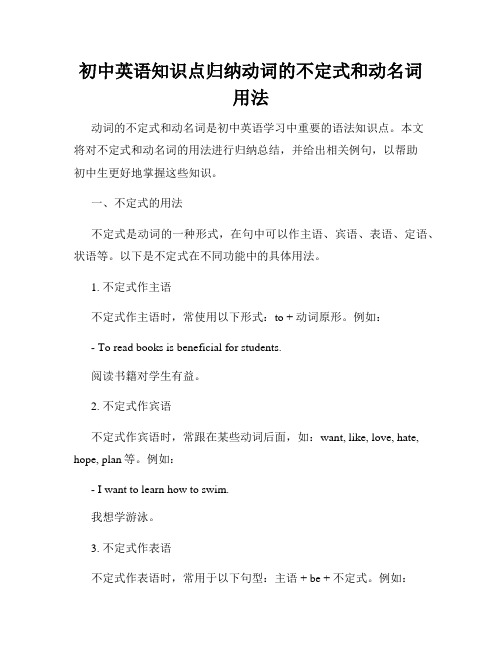
初中英语知识点归纳动词的不定式和动名词用法动词的不定式和动名词是初中英语学习中重要的语法知识点。
本文将对不定式和动名词的用法进行归纳总结,并给出相关例句,以帮助初中生更好地掌握这些知识。
一、不定式的用法不定式是动词的一种形式,在句中可以作主语、宾语、表语、定语、状语等。
以下是不定式在不同功能中的具体用法。
1. 不定式作主语不定式作主语时,常使用以下形式:to + 动词原形。
例如:- To read books is beneficial for students.阅读书籍对学生有益。
2. 不定式作宾语不定式作宾语时,常跟在某些动词后面,如:want, like, love, hate, hope, plan等。
例如:- I want to learn how to swim.我想学游泳。
3. 不定式作表语不定式作表语时,常用于以下句型:主语 + be + 不定式。
例如:- His dream is to become a doctor.他的梦想是成为一名医生。
4. 不定式作定语不定式可以作为名词的定语,放在名词前面修饰名词。
例如:- She has a book to read.她有一本可供阅读的书。
5. 不定式作状语不定式可以作时间、目的、原因、结果、伴随等状语。
例如:- She went to the store to buy some groceries.她去商店购买一些食品杂货。
二、动名词的用法动名词是将动词变为名词形式,以-ing结尾。
动名词可以作主语、宾语、表语、定语和状语等。
以下是动名词在不同功能中的具体用法。
1. 动名词作主语动名词作主语时,可以使用以下句型:动名词 + 动词。
例如:- Swimming is my favorite sport.游泳是我最喜欢的运动。
2. 动名词作宾语动名词可以作动词后面的宾语,也可以作介词后面的宾语。
例如:- I enjoy playing soccer.我喜欢踢足球。
- 1、下载文档前请自行甄别文档内容的完整性,平台不提供额外的编辑、内容补充、找答案等附加服务。
- 2、"仅部分预览"的文档,不可在线预览部分如存在完整性等问题,可反馈申请退款(可完整预览的文档不适用该条件!)。
- 3、如文档侵犯您的权益,请联系客服反馈,我们会尽快为您处理(人工客服工作时间:9:00-18:30)。
初中不定式和动名词一、动词不定式:构成:to + 动词原形1. 下列动词只能接不定式作:want 想要, agree 同意, choose 选择, decide 决定, expect 期望,hope 希望, earn 学会, need 必要, offer 提供, prefer 宁愿, +to dopromise保证, plan 计划refuse 拒绝, wish 希望, would like想要2. 下列动词只能接动名词(即动词+ing)Enjoy; mind; practice; finish;suggest ;deny;admit ; keep; spend; feel like + doing sth.enjoy doing sth., 喜欢做某事mind doing sth. 介意做某事,practice doing sth. 练习做某事finish doing sth. 做完某事feel like doing sth. 想要做某事keep doing sth. 坚持做某事have fun doing sth. 尽情做某事suggest doing sth.建议做某事deny doing sth. 否认做某事admit doing sth.承认做某事be/get used to doing sth. 习惯做某事look forward to doing sth. 盼望做某事spend…(in) doing sth. 花费时间做某事can’t help doing sth. 情不自禁做某事be busy doing sth 忙于做某事be worth doing sth 值得做某事prefer doing sth. to doing sth 与…相比更喜欢做某事pay attention to doing sth. 注意做某事3.有些动词后面既可接不定式,也可接动名词,意思相同。
如:begin/start to do sth.= begin/start doing sth开始做某事,like/love to do sth= like / love doing sth. 喜欢做某事;hate to do sth. =hate doing sth.憎恨做某事4. 有些动词后接不定式或名词时,意思不同。
如:1)remember doing sth. 记得作过某事(某事已做过)remember to so sth.记住去做某事(某事还没做)2)forget doing sth. 忘了作过某事(某事已做过)forget to do sth. 忘了去做某事(某事还没做)3)try to do sth.=do one’s best to do sth. 尽力去做某事try doing sth. 尝试做某事4)stop doing sth. 停止做某事(停止正在做的事)stop to do sth.停下来做某事(停止的事去做另外的事)5)go on doing sth. 继续做某事(同一件事)go on to do sth. 接着去做某事(不同的事)5.下列动词跟动词不定式充当宾语补足语:vt.+sb. to do sth. vt.+ sb.+not to do sth.Want/ask/ tell /order/ allow/ wish/beg/advise / call /invite +sb. to do sth.She told me to buy a ticket.她让我去买张票My mother often tells me not to go out at night.6.help 后的不定式可带to, 也可不带toThe teachers helped the students (to) learn English well. 那些老师帮助学生学好英语。
He often helps his mother (to) tidy up the room.他经常帮助他妈妈整理房间。
7. 动词不定式省to的情况一感feel二听hear, listen to +sb. do sth.三使have, let, make四看see, watch, look at, notice常考短语:hear/see/ make / let sb. do sth.被动语态:Sb. be heard/ seen/made/let to do sth.(变成被动语态时补回to)I often see him help others. He is often seen to help other by me.二、动词不定式的句式:1..动词不定式作主语,主语较长时,常用it作形式主语,而将真正的主语放在句。
It + is/was+adj.+(for sb.) + to do sth.To learn English well is useful. = It’s useful to learn English well.学好英语是有用的。
To protect environment is important for us.= It’s important for us to protect environment.对于我们来说保护环境是很重要的。
2. It is / was + adj.(kind / good/ nice/ clever) + of sb. +to do sth.It’s very kind of you to help me. =You are very kind to help me你帮助我真是太好啦。
It’s very clever of you to do like that.=You are clever to do like that你那样做真的太聪明啦。
这个句型的形容词为表示人的品格,气质之类的词。
可以等于句型:sb. is / was + adj. +to do sth.3. It takes ( took , will take ) sb. some time to do something. (做某事花费某人…时间)4.. 主语+ find / think + it +形容词+ (for sb.) + to doI find it easy to read English every day. 我发现每天读英语和容易的。
He felt it hard to sleep.他觉得很难入睡。
I think it very interesting to learn English. 我认为学英语很有趣。
We found it impossible to cross the river. 我们发现过河是不可能的。
5.不定式作表语表示主语的“职业、职责或性质”等Her job is to clean the hall. 她的工作就是打扫大厅。
My dream is to be a teacher.我的梦想是当一名教师。
6.不定式作状语的用法He worked day and night to get the money.(表目的)他日夜工作来赚钱。
He is too young to go to school. (表结果)他太小以致不能上学。
They were very sad to hear the news.(表原因)听到这个消息他们非常伤心。
The question is simple for him to answer.(表程度)这个问题对他来说太容易回答了。
7. 动词不定式可以和疑问词who, what, which, when, how, where(why除外)等连用,构成不定式短语。
Can you tell me how to get to the post office?I didn’t know what to do next.How to learn English well is the question that we all want to ask.The question is when to get there.What to do 与how to do 的区别:I don’t know what to do next?我不知道下一步该做什么。
(What to do后没有sth.)I don’t know how to use this machine.我不知道怎么样使用这部机器(how to do +sth.)三、动名词(动词+ing)作用相当于名词。
(可以作主语、宾语、表语和定语)1.Reading is an art. 读书是一种艺术。
(作主语)2.Your task is cleaning the windows.你的任务就是擦窗户。
(作表语)3. He likes swimming.(作宾语)4.a washing machine 洗衣机,a reading room 阅览室(作定语)非谓语动词(不定式和动名词)专练()1. Mother told her son in the street.A. not playB. to not playC. doesn’t playD. not to play( ) 2. His wish was a scientist.A. to becomesB. becomesC. becomeD. to become( ) 3. It’s raining hard. You’d better .A. go outB. not go outC. not to go outD. to not out( ) 4. Do you know washing machine?A. where to getB. to where to getC. where getD. to where get( ) 5. The students don’t know next.A. how toB. what to doC. what doD. do what( ) 6. Would you mind me how English words?A. telling , to rememberB. telling, rememberC. tell, to rememberD. tell, remember( ) 7. Mr. Brown asked us to stop , and we stopped him at once.A. talking, to listen toB. to talk, to listenC. talking, listeningD. talk, listen( ) 8. --What are you going to be after you finish college?--I’m going to be a singer, but my parents me to be a doctor.A. hopeB. wantC. makeD. let( ) 9.-- I saw Betty go to Grandpa Zhang’s home just now.--Yes , she is often seen the old man with his housework.A. helpB. to helpC. helpsD. helped( ) 10. ---Do you need to get there before ten? ---No, I .A. don’t have toB. don’t needC. can’tD. mustn’t( ) 12. After she finished the letter, she went to bed.A. to writeB. writingC. writtenD. wrote( ) 13. It was very late at night, he still went on .A. worksB. workedC. workingD. work( ) 14.-- Have you finish the book?--Not yet. I’ll try it to you before Friday.A.reading, returning,B. to read, to returnC. reading, to return,D. to read, returning ( ) 15. The old man is strong enough. He prefers to .A. walking, ridingB. walk, rideC. to walk, rideD. walking, ride( ) 16. I have quite a few people .A. take care ofB. to take care ofC. to take careD. take care( ) 17. I usually forget the door, but I remembered it when I left yesterday.A.closing, closingB. to close, to closeC. to close, closingD. closing, to close ( ) 18. I’m made thirsty by the strange thing.A. feelB. feelingC. to feelD. felt( ) 20. I’m sorry your friend is ill.A. hearB. to hearC. listenD. to listen( ) 21. ---Will you please tell John to come to my office? --- .A. Yes, I doB. I’ll be gladC. Thank youD. I’ll be glad to( ) 22. Have you read the book? It’s worth .A. readB. to readC. readingD. to reading( ) 23. This box is too heavy for the child .A. to carry itB. to carryC. carryingD. carrying it( ) 24. The young man is old enough the army.A. joinB. joiningC. to joinD. joins( ) 25. The flowers need .A. wateringB. to waterC. waterD. watered( ) 27. --Have you finished the work?--Not yet, but no matter how hard it is, we’ll keep until we make it.A. failedB. tryingC. triedD. falling( ) 28. --Do you want to eat something? -- . thanks. I am feeling sick now. I don’t feel like .A. Yes, eating somethingB. No, to eat anythingC. Yes, to eat anythingD. No, eating anything( ) 29.-- Do you still remember me sometime in Shanghai?--Yes, of course. Two years ago.A. to seeB. seeC. seeingD. saw( ) 30. It took us a long time Hawaii, but we thought the journey was enjoyable.A. to getB. gettingC. to reachD. reaching( ) 31. I t’s important the piano well.A. of him to playB. for him to playC. of him playingD. for him playing( ) 32. Good manners usually help people to each other.A. get on well withB. get startedC. get togetherD. get ready( ) 33. Our teacher always tell us more English in and out of class.A. speakB. spokenC. to speakD. speaking( ) 34. My mother often asks me early.A. get upB. got upC. getting upD. to get up( ) 35. --Shopping with me? --Sorry, I have a lot of clothes .A. to washB. washedC. washD. to be washed( ) 36. She needs some paper to .A. writeB. write inC. write withD. write on( ) 37. Listening! Can you hear a baby ?A. cryB. to cryC. cryingD. cries( ) 38. When people want to relax themselves, they prefer TV or listen to music rather than newspapers.A. watching, readB. watching, to readC. to watch, readD. to watch, reading ( ) 40. Will you go shopping together with us this Saturday, Jenny? Yes. .A. I doB. I’d like toC. I’d love to doD. I’m busy。
